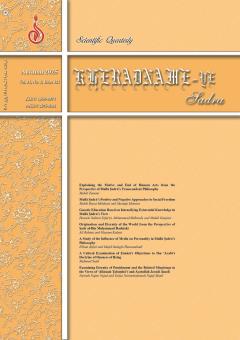About the journal
The Quarterly of Kheradname-ye Sadra is the first specialized journal of philosophy in Iran. It is published by the Sadra Islamic Philosophy Institute in order to explain and analyze the ideas of Mulla Sadra, in particular, and disseminate Islamic philosophy in general. The first issue of this Journal was published on 21st April 1995 with a scientific-promotional rank. This Journal has provided an appropriate context for introducing the differences between Islamic philosophy and Greek or Western philosophies.
This Quarterly welcomes papers in related fields from all thinkers and interested scholars in the field of Islamic philosophy.
Recent Articles
-
Open Access Article
1 - سرمقاله
S. Mohammad KhameneiIssue 1 , Vol. 31 , Autumn 2025 -
Open Access Article
2 - Explaining the Motive and End of Human Acts from the Perspective of Mullā Ṣadrā’s Transcendent Philosophy
Mehdi Zamani *Issue 1 , Vol. 31 , Autumn 2025 -
Open Access Article
3 - Mullā Ṣadrā’s Positive and Negative Approaches to Social Freedom
Mehdi Bayatmokhtari * ، Mostafa MomeniIssue 1 , Vol. 31 , Autumn 2025 -
Open Access Article
4 - Gnostic Education Based on Intensifying Existential Knowledge in Mullā Ṣadrā’s View
Hossein Soltani Esferizi ، Mohammad Bidhendi * ، Mahdi GanjvarIssue 1 , Vol. 31 , Autumn 2025 -
Open Access Article
5 - Origination and Eternity of the World from the Perspective of Ṣadr al-Dīn Muḥammad Dashtakī
Ali Rahimi * ، Ghasem KakaieIssue 1 , Vol. 31 , Autumn 2025 -
Open Access Article
6 - A Study of the Influence of Media on Personality in Mullā Ṣadrā’s Philosophy
Elham Jafari ، Majid Sadeghi Hasanabadi *Issue 1 , Vol. 31 , Autumn 2025 -
Open Access Article
7 - A Critical Examination of Zunūzī’s Objections to Ibn ‘Arabī’s Doctrine of Oneness of Being
Mahmud Saidi *Issue 1 , Vol. 31 , Autumn 2025 -
Open Access Article
8 - Examining Eternity of Punishment and the Related Misgivings in the Views of ‘Allāmah Ṭabāṭabā’ī and Āyatullāh Javādī Āmolī
Naimeh Najmi Nejad * ، Yahya Noormohammadi Najaf AbadiIssue 1 , Vol. 31 , Autumn 2025
Most Viewed Articles
-
Open Access Article
1 - Foreword
Seyyed Mohammad KhameneiIssue 4 , Vol. 22 , Summer 2017 -
Open Access Article
2 - -
Seyyed Mohammad KhameneiIssue 4 , Vol. 22 , Summer 2017 -
Open Access Article
3 - foreword
Seyyed Mohammad KhameneiIssue 3 , Vol. 23 , Spring 2018 -
Open Access Article
4 - 22th congress on Mulla Sadra
Seyyed Mohammad KhameneiIssue 4 , Vol. 23 , Summer 2018 -
Open Access Article
5 - Cheif Editor's Note
Seyyed Mohammad KhameneiIssue 1 , Vol. 22 , Autumn 2016 -
Open Access Article
6 - Foreword
Seyyed Mohammad KhameneiIssue 1 , Vol. 24 , Autumn 2018 -
Open Access Article
7 - Foreword
Seyyed Mohammad KhameneiIssue 2 , Vol. 24 , Winter 2019 -
Open Access Article
8 - Editor's Note
Seyyed Mohammad KhameneiIssue 3 , Vol. 24 , Spring 2019 -
Open Access Article
9 - Editor note
Seyyed Mohammad KhameneiIssue 1 , Vol. 25 , Autumn 2019 -
Open Access Article
10 - Forewodr
Seyyed Mohammad KhameneiIssue 4 , Vol. 23 , Summer 2018






